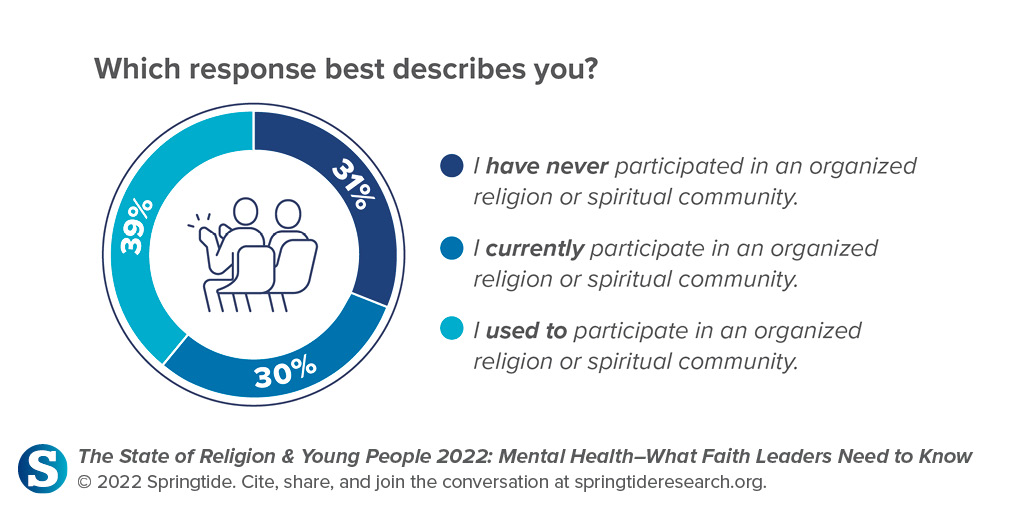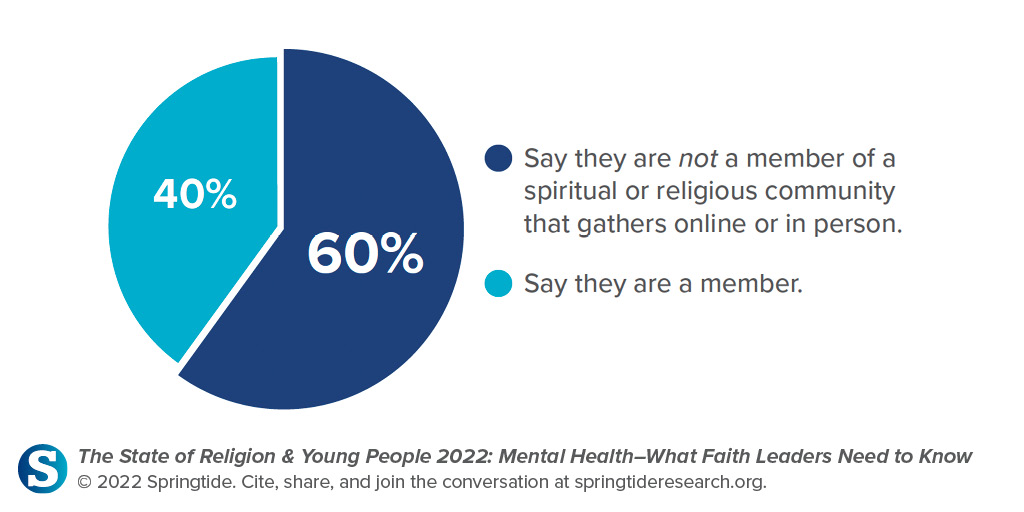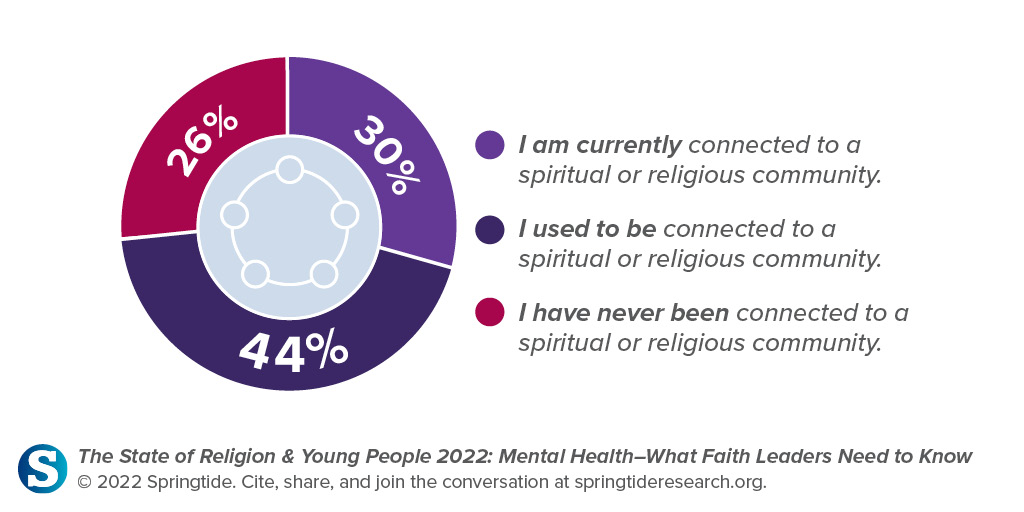
Gen Z and Service Attendance: Why They Don’t Go (More Often)
Those in ministry often ask, “Why don’t young people come to religious services?” Service attendance isn’t the primary marker of a full spiritual life, especially for Gen Z. Sixty-eight percent of young people we surveyed for The State of Religion & Young People 2023: Exploring the Sacred said they were at least slightly religious, and 78% said they were at least slightly spiritual. Many of them engage in multiple religious and spiritual practices, regardless of their affiliation or lack thereof.
That said, our data do show the same patterns of declining service attendance seen in previous generations. Young people do still go to church (36% of the people we surveyed said they attend church at least once a month), but almost an equal amount never attend.
What keeps young people away from services, or from engaging in these more traditional environments? Here’s what young people reported in previous research studies:
Some young people are finding their faith outside of organized religion. Here’s what young people said in The State of Religion and Young People 2020: Relational Authority:
I’m not connected to a particular faith, but a generalized faith. I mean, I use prayer, but I don’t know that I would connect it to anything certain. I feel like I’m more influenced by trying to do good for humans in general. I don’t think it has necessarily anything to do with my spiritual beliefs. I mean, obviously you can see there’s a connection, but I feel like it’s more about me helping people.
—Helen, 23
“I do not attend any church. I still consider myself someone of faith and someone who has spiritual affiliation, but I do not believe in organized religion.”
—Chris, 19
It’s also important to note that not all young people are leaving religious and spiritual communities. A growing number of young people report having never been involved in a faith community to begin with. Young people who grow up without particular religious or spiritual frameworks generally find sources of meaning and values elsewhere.



Some young people feel like their needs aren’t met in traditional religious and spiritual environments. In the State of Religion & Young People 2021: Navigating Uncertainty, we asked young people why they might not turn to religion or religious communities when navigating difficulties.
Why, when facing uncertain and difficult times, do you not participate in religious practices or turn to religious communities?
Percentage of young people who agreed with each statement:
This chart illustrates a set of deeper needs that young people feel religious communities don’t always meet, especially in times of uncertainty. Young people are evaluating spaces based on their own beliefs, how safe they feel to be themselves, and how comfortable they feel to express doubt.
I’m not really into religion anymore. I just don’t like it. Over the summer and last year, I built up a relationship with God. I don’t like to attach any religion to it because I just don’t have good experiences with things that are, that are said within Christianity and stuff like that. But after I build up, well, as I continue to build up a relationship with God, it’s about just believing what God shared with me every day.
—Lauren, 18
Well, religion in general is a really complicated topic for me. Because, I mean, yeah, I’m Muslim. But then I feel I’m more like culturally Muslim because I don’t really believe in any sort of “religion,” I guess. I think a lot of people my age share my opinion about organized religions and churches and things like that—how harmful those can be. For older generations, it was like you had to be part of a church or some sort of organization in order to be a faithful kind of person. And I think my generation is kind of changing that narrative, and we can kind of believe whatever we want and still consider ourselves good people.
—Amira, 15
I have been exposed to people who’ve completely left the church because they’ve been hurt by it. And I’ve also visited some churches that I have really, really loved and resonated with, but I’ve also been really hurt by some, some churches as a whole, not just people and some of the basic beliefs that exclude other people or don’t necessarily teach love. So I’ve had a really hard time with the Christian church, but I also really see the importance of having a congregation of people that all believe we originated from the same place and have the same love and spirituality.
—Viola, 17
Some young people are skeptical of what they see and hear in traditional religious and spiritual environments. In interviews for The State of Religion & Young People 2022: Mental Health, young people told us that they have a hard time trusting religious organizations and people because the positive expectations promoted formally by the institutions aren’t always lived out by their members, which can cause mental strain.
I didn’t see the church putting its money where its mouth was, so to speak. So I saw members of the church judging people for coming into Mass in soccer shorts or, you know, silly things that shouldn’t matter. It’s just kind of that hypocrisy, I guess. My least favorite thing the church ever did was they bought a $15,000 nativity set from, Jerusalem or something like that. [It was] this huge, hand-carved set, and I mean, it was gorgeous, but also that wasn’t $15,000 that was going to anything that would actually help people. I think that those kinds of things caused me more distress and caused me to feel less like I belonged in that space. And for people who are on the intersections of a lot of different identities, that can do a lot of harm.
—Lucy, 23
So how can those in ministry engage young people even if they’re not coming to services? Ministers can serve as role models in faith for young people they do meet. Here’s three ways to engage in what may seem like limited opportunities:
- Many young people want to learn, understand, and expand their knowledge when it comes to belief. Adults can guide them in that process. Seeking answers and leaning into mystery can both be holy activities for young people as they navigate some of life’s biggest questions. One of the best things an adult can do is to practice saying, “I’m not sure about the answer to that question—let’s find out together.”
- Young people often want to talk to adults who listen actively and expose them to new ideas. Adults can engage them in conversations about anything—it doesn’t always have to be about religion. This process not only helps young people express their thoughts and feelings verbally, but it also allows adults to introduce them to new information and points of view.
- Young people want to experience genuine love and care. Many religious traditions have at least some imagery or language that connects God with the experience of love. Leading with that message of unconditional love opens the door to young people who overwhelmingly wish to belong and be loved.
Interested in learning more? Download our free report to get key characteristics, trends, and demographics about 13-year-olds and Generation Alpha.



